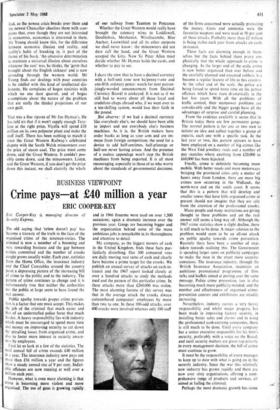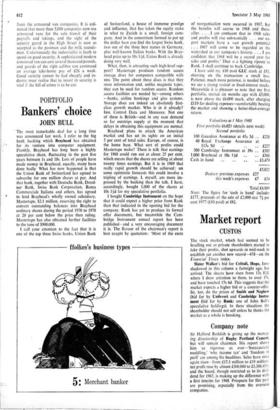Crime pays — at 240 million a year
BUSINESS VIEWPOINT ERIC COOPER-KEY
Eric Cooper-Key is managing director of Security Express.
The old saying that 'crime doesn't pay' has become a travesty of the truth in the face of the organised crime of the . nineteen-sixties. The criminal is now a member of a booming and very rewarding business and the gap between crimes committed and the number of crooks caught grows steadily wider. Each year, statistics from the Home. Office, the insurance industry and the Chief Constables around the country paint a depressing picture, of the increasing bill of crime to the public and to the industry. The pattern of crime continues to change and it is unfortunately true that neither the authorities nor the public at large seem to have found the real answer.
Public apathy, towards proper crime preven- tion is a factor that one insist accept. This makes the job of the criminal, that much easier and that of an understaffed police force that much harder. A heavy responsibility lies with industry Which must be encouraged to spend more time and money on -improving security to Cut down the spiralling losses from:organised crime, and also to foster more interest in security aware- ness by employees.
First let us look at a few of the statistics. The total annual bill of crime exceeds £40 million in a year. The insurance industry now pays out more than £16 million, a year and the figures show a steady annual rise of 9 per cent. Indict- able offences are now running at well over a million each year.
However, what is even more alarming is that crime is becoming more violent and more Organised. The use of guns is growing rapidly and in 1966 firearms were used on over 1,500 occasions; again a dramatic increase over the previous year. Gangs are becoming bigger and the organisation behind some of the more ambitious jobs is remarkable in its thoroughness and attention to detail.
My company, as the biggest movers of cash in the United Kingdom, finds these facts par- ticularly disturbing. Our 300 armoured vans are daily moving vast sums of cash and clearly have become a prime target for the crooks. We publish an annual survey of attacks on cash-in- transit and the 1967 report looked closely at over a hundred attacks to study the methods used and the pattern of this particular crime. In these attacks more than £260,000 was stolen. The most alarming feature of this survey was that in the average attack the crooks always outnumbered companies' employees by more than two to one. In these 100-odd attacks, over 400 crooks were involved whereas only 180 staff of the firms concerned were actually protecting the money. Guns and ammonia were the favourite weapons and were used in 50 per cent of these attacks. Probably more than £2 million is being stolen each year from attacks on cash- in-transit.
These facts are alarming enough in them- • selves but the facts behind them prove em- phatically that the whole approach to crime is changing. At the larger end of the scale, crime is now better organised than ever before and the carefully planned and executed robber), has become a regular feature of life in this country. At the other end of the scale, the police are being forced to spend more time on the pettier offences which have risen dramatically in the last few years. With all the problems of traffic control, their manpower problems are considerable and the bigger gangs have all the advantages of surprise and careful planning.
From the evidence available it seems that in Britain today there are few permanent gangs. The normal pattern is for one or two men to initiate an idea and collect together a group of experts, each one with a specific task. In the last year or two, this pattern appears to have been employed on a number of big crimes like the West End jewellery raids and a number of pay snatches where anything from £20,000 to £60,000 has been hijacked.
Finally, crime is definitely becoming more mobile. With better roads and more motorways bringing the provincial cities only a matter of hours away from London, there are more big crimes now occurring in the Midlands, the north-west and on the south coast. It seems that this is a pattern that will develop and smaller towns that have little organised crime at present should not imagine that they are safe from the attention of the professional crooks.
Many people and many institutions are giving thought to these problems and yet the real answer still seems a long way off. Although the 1967 crime statistics show a slight decline, there is still much to be done. A major solution to the problem would seem to be an all-out attack on public apathy towards crime prevention. Recently there have been a number of steps taken towards realising this. The Government is spending larger sums on publicity campaigns to make the man in the street more security- 'conscious. The insurance industry, through the British Insurance Association,. maintains an ambitious promotional programme of film, talks and leaflets aimed at putting over the same message. Police crime prevention, too, is also becoming much more publicity-minded, and the number and effectiveness of organised crime- prevention courses and exhibitions are steadily increasing.
Nevertheless, industry carries a very heavy responsibility and whilst major progress has been made in improving factory security, in installing better safes and alarms and in using the professional cash-carrying companies, there is still much to be done. Until every company has a senior executive responsible for his firm's security, preferably with a voice on the Board, and until security matters are given top priority in every management decision, the bill of crime must continue to grow.
It must be the responsibility of every manager to keep up to date with what is going on in the security industry. Since the war this relatively new industry has grown rapidly and there are now over sixty organisations offering a com- prehensive range of products and services, all aimed at foiling the criminal.
Perhaps the most dramatic growth has come from the armoured van companies. It is esti- mated that more than 5,000 companies now use armoured vans for the safe transit of their payrolls and takings, and the sight of the security guard in the High Street is now as accepted as the postman and the milk rounds- man. Unfortunately the industrialist is loath to spend on good security. A sophisticated modern armoured van can cost several thousand pounds, and guards of the right calibre can command an average take-home pay of £26 a week. Good security cannot be had cheaply and in- dustry must realise that to invest in security is vital if the bill of crime is to be cut.







































 Previous page
Previous page